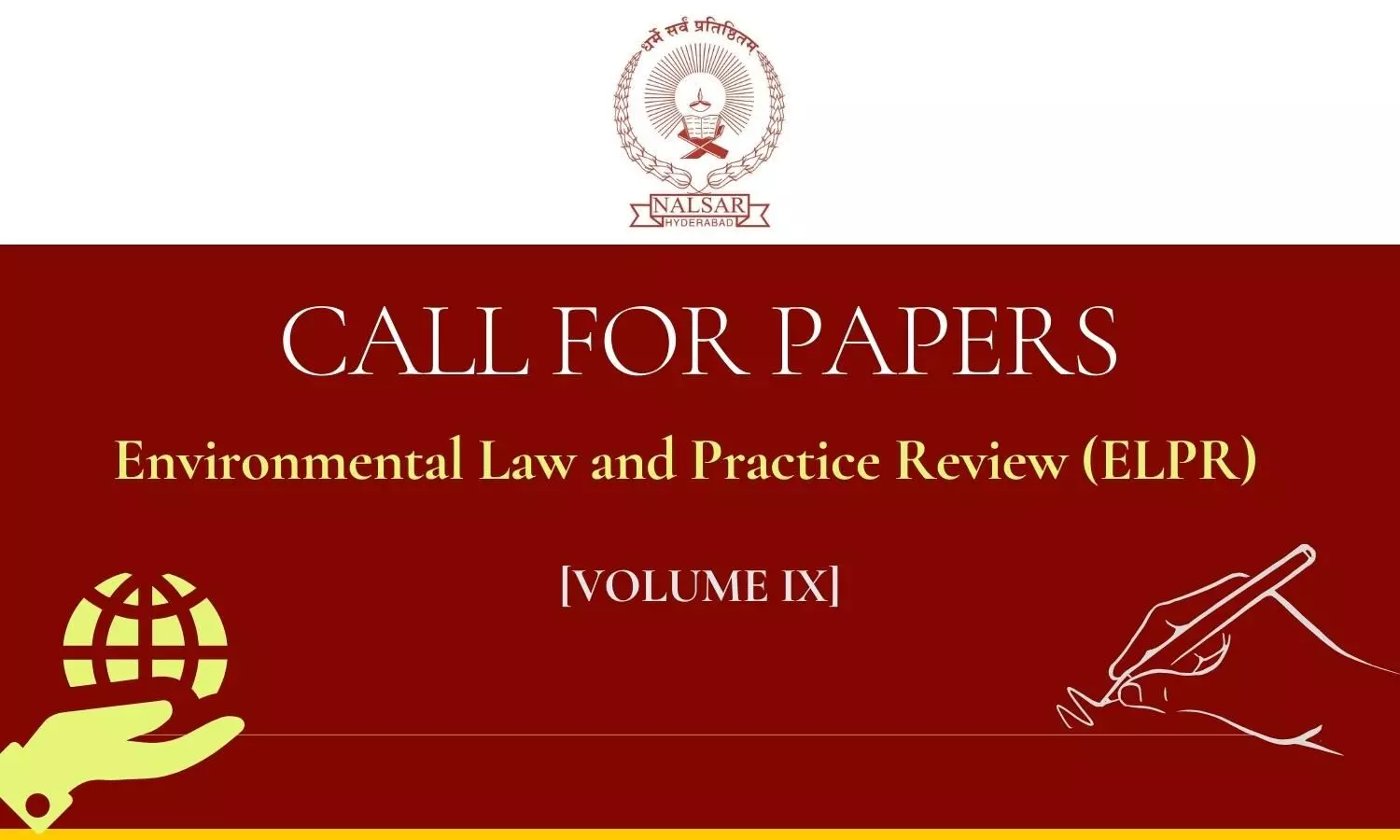Call for Papers: Environmental Law and Practice Review (ELPR) Volume 9 | NALSAR Hyderabad
ELPR, NALSAR University of Law, Hyderabad inviting submissions. Scroll down for more details!

Environmental Law and Practice Review (ELPR), a publication of NALSAR University of Law, Hyderabad inviting submissions in the field of environmental law and policy for its Volume 9.
About ELPR
It is a blind peer-reviewed journal and is the only Indian journal committed solely to the developments and trends that characterize Environmental Law. ELPR publishes articles on a variety of issues such as natural resources law, environmental policy and other such allied topics pertinent to Environmental law.
Publication Policy
- We accept contributions in the form of articles, essays, notes and comments.
- ELPR firmly believes in the importance of originality of ideas and therefore any material submitted to the Journal should not have been published elsewhere or be under consideration at any other publication.
- Joint authorship is permitted and there is no specific cap on the number of authors per submission. Plagiarism in any form shall result in instant rejection of the submission.
- The decision of the Board of Editors in this matter is final and binding.
- The Editorial Board of ELPR shall not be responsible for any material that is libelous or scandalous and the author shall be deemed to have obtained the permission of the referred author in case the work is unpublished.
Theme
The Journal welcomes submissions from academicians, legal practitioners, students, and researchers from the legal community. The research articles may focus on, but are not limited to, the suggested broad themes:
- Comparative Approaches in International Environmental Law
- International & Regional Environmental Governance
- Concept of Justice, Equity, Global Divide in Environmental Negotiations and Diplomacy
- Gender-related Approaches in Environmental Law
- Business, Trade and Environmental Law
- Environmental Law and Technology
- Climate Change and Biodiversity Loss
- Environmental Judicial Review systems
- Any other contemporary issues
Categories
I. Article
- An article may be an exposition of lacunae prevailing in contemporary laws of any country, a comparative study of different laws, or the publishing of research data and analysis in the area of environmental sciences and law.
- Along with articles engaging in current contemporary themes, pure theoretical works are also welcome.
- It is advisable that the article has a theme or a core argument around which it would ideally revolve.
- The author is expected to make a comprehensive study of the subject and offer fresh innovative solutions for the same.
- The article should not exceed 10,000 words (inclusive of footnotes).
II. Essay
- An essay, as opposed to an article is expected to be more concise and succinct in scope and ought to engage in a contemporary problem in the field of environmental sciences and law without indulging in excessive theorizing.
- The beauty of a good essay lies in the ability of the author to put forward original arguments, observations and criticisms without compromising on brevity.
- Moreover, an essay should ideally focus on a legal debate, interpretation of law(s) with a genuine approach to the problem.
- It should essentially be a concrete and logical manuscript built around a specific/ particular predicament. In other words, the norm is specificity rather than generality.
- An essay should not exceed 6,000 words (inclusive of footnotes).
III. Case Comment/Legislative Critique & Notes
- The author may choose to critique an existing legislation, which may be an Act, Regulation, Rule, Scheme, Policy, Guideline etc. In the alternative, the author may also critique and analyse a bill which is tabled before the Parliament of any country.
- A case comment requires a thorough analysis of the various aspects of the legislation and may focus on the consequences of changes and amendments that would entail before and after its implementation (if the author suggests any).
- A case comment/legislative critique should not exceed 3500 words (inclusive of footnotes).
IV. Book Review
- A book review shall ideally incorporate a complete analysis and an overview of the book, along with special reference to the original author’s ideas, his writing style etc.
- Direct lifting of more than thirty words (i.e. a paragraph) from the book being reviewed is strictly discouraged and will result in immediate disqualification.
- The book being reviewed must pertain to core issues of environmental law or science.
- It must not date back to more than three years from its date of issue/ publication in the public domain. Although there is no strict word limit for a book review, it should be concise enough to provide the reader a holistic review of the book.
- A book review should not exceed 3000 words (inclusive of footnotes).
Submission Guidelines
1. Format
- Submissions are preferred in Times New Roman font, with 1.5 line spacing.
- Main text should be in font size 12 and footnotes in font size 10.
- All submissions must be compatible with Microsoft Word 2003 and 2007.
2. Word Limit
As has been already indicated, the word limit inclusive of footnotes is as follows:
- Article – 10,000 words
- Essay- 6,000 words
- Case Comment/Legislative Critique & Notes – 3500 words
- Book Review – 3000 words
3. Citation Format
- A uniform format of citation needs to be followed throughout the submission.
- Speaking footnotes are discouraged.
Abstract and Final submission
- An abstract of maximum 500 words must be submitted on or before 15th December 2023.
- Maximum of 5 keywords are to be provided along with the abstract.
- Acceptance of abstracts shall be communicated via email by 30th December 2023.
- On acceptance of the abstract, the selected author(s) of abstract must submit the full-length paper on or before 15th March 2024 for peer review process.
- The submissions may be directed to elpr@nalsar.ac.in
Biographical Information of Authors
- A separate document with biographical information of the authors must also be attached including the following details: Name, E-mail address, Postal Address, Name and Address of the Institution, Course (if applicable), and Academic Year.
- Please do not mention the above-mentioned information in the main manuscript, as this would allow the editorial board to successfully conduct an anonymous review.
Contact
Email: elpr@nalsar.ac.in.
Important Links
Law Library: Notes and Study Material for LLB, LLM, Judiciary, and Entrance Exams

